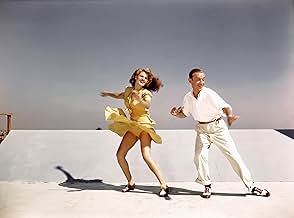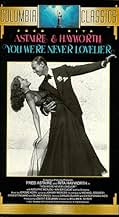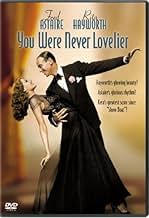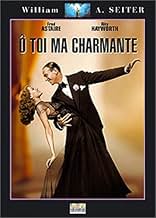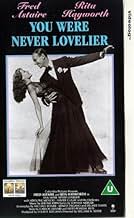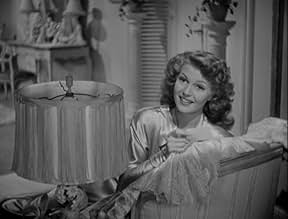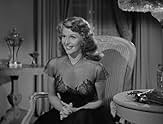CALIFICACIÓN DE IMDb
7.1/10
4.4 k
TU CALIFICACIÓN
En Buenos Aires, un hombre que ha dispuesto que sus hijas se casen por orden de edad, permite que un bailarín estadounidense actúe en su club con la única condición de que sea el pretendient... Leer todoEn Buenos Aires, un hombre que ha dispuesto que sus hijas se casen por orden de edad, permite que un bailarín estadounidense actúe en su club con la única condición de que sea el pretendiente de su segunda hija.En Buenos Aires, un hombre que ha dispuesto que sus hijas se casen por orden de edad, permite que un bailarín estadounidense actúe en su club con la única condición de que sea el pretendiente de su segunda hija.
- Dirección
- Guionistas
- Elenco
- Nominado a 3 premios Óscar
- 3 nominaciones en total
Kirk Alyn
- Julia's Groom
- (sin créditos)
Desi Arnaz
- Band Singer
- (sin créditos)
Larry Arnold
- Wedding Guest
- (sin créditos)
William A. Boardway
- Wedding Guest
- (sin créditos)
Stanley Brown
- Roddy - Cecy's Boyfriend
- (sin créditos)
George Bunny
- Flower Man
- (sin créditos)
James Carlisle
- Wedding Guest
- (sin créditos)
Jack Chefe
- Nightclub Patron
- (sin créditos)
Opiniones destacadas
Pop quiz: Who was Fred Astaire's favorite female dancing partner? If your answer is the obvious one, Ginger Rogers, guess again. Cyd Charisse, Vera-Ellen, Judy Garland, Joan Leslie, Eleanor Powell? Still wrong. Surprisingly, Astaire long maintained that his favorite was none other than Rita Hayworth. Rita, he once said, could be taught a complicated piece of choreography in the morning and have it down pat after lunch! The two made a pair of films together, "You'll Never Get Rich" in 1941 and "You Were Never Lovelier" in '42. A look at Hayworth's work in the latter film will demonstrate what a remarkable learner she apparently was. She and Fred share several musical numbers here, including the moonlit garden waltz to "I'm Old Fashioned" and the remarkably high-spirited and dynamic "Shorty George," and the two do make a marvelous pair. As for the rest of the film, it is a typical Astaire comedy, replete with mistaken identities, concerning Rita's father, Adolphe Menjou, convincing Fred to impersonate the fictitious lover that he has devised for her. The viewer must wait almost 40 full minutes to see Fred dance in this one, but that wait is well repaid when Astaire explodes in a brash and frenetic audition number for ol' Adolphe. The film's script is bright and amusing, Xavier Cugat's orchestra adds colorful support, and Rita is at least as beautiful, if not more so, than in 1946's overrated "Gilda." Bottom line: This is no Fred & Ginger picture, but it sure does have its compensations...Rita Hayworth surely being one of them.
Okay, it's not Tosca. But holy smoke, what an efflorescence of talented song writers and lyricists the American stage produced in the thirty years between 1925 and 1955! Irving Berlin, George and Ira Gershwin, Yip Harburg, Johnny Mercer, Jerome Kern, Cole Porter, the list goes on. And the songs! From Astaire's films alone, we have Orchids in the Moonlight, The Carioca, Let's Face the Music and Dance, Yesterdays, Smoke Gets in Your Eyes, Cheek to Cheek, The Way You Look Tonight, A Fine Romance, They All Laughed, Let's Call the Whole Thing off ("You say tomato, I say tomahto..."), They Can't Take That Away From Me. That's a handful of the more familiar numbers from the first films Astaire made with Ginger Rogers.
"You Were Never Lovelier" has melodies by Jerome Kern and lyrics by Johnny Mercer. Ginger isn't here, but Rita Hayworth is. Her beauty is undeniable. She'd undergone hair removal and Hollywood glamorization by this time and in a few years a pin-up pic of her was to be pasted onto a famous bomb. I missed Astaire's earlier movies. By the time I was old enough, Gene Kelly dominated the screen. I saw Astaire in his later films and didn't like him nearly as much as Kelly. Kelly's background was in athletics. He was masculine and muscular and working class. Astaire's background was in ballroom dancing. How can an adolescent identify with a skinny balding narrow-shouldered dancer in a tuxedo who doesn't swing from ropes? But there's no longer much doubt in most peoples' minds, including mine, that Astaire was by far the better dancer, Kelly's charm notwithstanding. Astaire was elegant and precise and his dance steps were varied; Kelly seemed to repeat his leg-over-leg jumps over and over in each number.
At any rate, the plot of "You Were Never Lovelier" is rather original for an Astaire musical. I don't think it goes farther back in history than Aristophanes. It's a complicated business involving mistaken identities, an interfering father, and whatnot. But it doesn't matter, because the numbers are what counts. Kern and Mercer provide two songs that have become standards: "Dearly Beloved" and "I'm Old Fashioned." Anyone who wants to see the Hollywood musical at its best would be advised to listen to either song and to watch the dancing during "I'm Old Fashioned." "Dearly Beloved" occurs throughout the film as a kind of theme, and is sung once by Astaire and once by Hayworth, but is never accompanied by a dance. There are other songs too, of course, although none enchants the way these two ballads do. One of the numbers is "The Shorty George." Astaire's movies often had references to a new popular dance craze -- The Carioca, The Yam, the Sluefoot -- and this is an instance of that tendency. It was named after a real dancer, George Snowden, a dancer at the Savoy Ballroom in Harlem, known as "Shorty." If "I'm Old Fashioned" has a swooping grace, "The Shorty George" includes sections set at a blistering tempo and demonstrates Rita Hayworth's energy and range as a dancer.
Speaking of energy, how do they do it? "I'm Old Fashioned", like most of Astaire's numbers, consists of very long takes in medium distance that depend on both precision and physical stamina. (If you want to see an example of the opposite, watch Travolta do his final number in "Staying Alive.") I counted three cuts during the entire dance, which lasts four minutes and thirty-seven seconds. I'd have a heart attack after the first thirty-seven seconds.
Well, okay. It's not Fred and Ginger. It's not even Tosca. But if you want to watch two people engaged in the unpretentious exercise of a physical skill acquired only with the utmost difficulty, this one shouldn't be missed.
"You Were Never Lovelier" has melodies by Jerome Kern and lyrics by Johnny Mercer. Ginger isn't here, but Rita Hayworth is. Her beauty is undeniable. She'd undergone hair removal and Hollywood glamorization by this time and in a few years a pin-up pic of her was to be pasted onto a famous bomb. I missed Astaire's earlier movies. By the time I was old enough, Gene Kelly dominated the screen. I saw Astaire in his later films and didn't like him nearly as much as Kelly. Kelly's background was in athletics. He was masculine and muscular and working class. Astaire's background was in ballroom dancing. How can an adolescent identify with a skinny balding narrow-shouldered dancer in a tuxedo who doesn't swing from ropes? But there's no longer much doubt in most peoples' minds, including mine, that Astaire was by far the better dancer, Kelly's charm notwithstanding. Astaire was elegant and precise and his dance steps were varied; Kelly seemed to repeat his leg-over-leg jumps over and over in each number.
At any rate, the plot of "You Were Never Lovelier" is rather original for an Astaire musical. I don't think it goes farther back in history than Aristophanes. It's a complicated business involving mistaken identities, an interfering father, and whatnot. But it doesn't matter, because the numbers are what counts. Kern and Mercer provide two songs that have become standards: "Dearly Beloved" and "I'm Old Fashioned." Anyone who wants to see the Hollywood musical at its best would be advised to listen to either song and to watch the dancing during "I'm Old Fashioned." "Dearly Beloved" occurs throughout the film as a kind of theme, and is sung once by Astaire and once by Hayworth, but is never accompanied by a dance. There are other songs too, of course, although none enchants the way these two ballads do. One of the numbers is "The Shorty George." Astaire's movies often had references to a new popular dance craze -- The Carioca, The Yam, the Sluefoot -- and this is an instance of that tendency. It was named after a real dancer, George Snowden, a dancer at the Savoy Ballroom in Harlem, known as "Shorty." If "I'm Old Fashioned" has a swooping grace, "The Shorty George" includes sections set at a blistering tempo and demonstrates Rita Hayworth's energy and range as a dancer.
Speaking of energy, how do they do it? "I'm Old Fashioned", like most of Astaire's numbers, consists of very long takes in medium distance that depend on both precision and physical stamina. (If you want to see an example of the opposite, watch Travolta do his final number in "Staying Alive.") I counted three cuts during the entire dance, which lasts four minutes and thirty-seven seconds. I'd have a heart attack after the first thirty-seven seconds.
Well, okay. It's not Fred and Ginger. It's not even Tosca. But if you want to watch two people engaged in the unpretentious exercise of a physical skill acquired only with the utmost difficulty, this one shouldn't be missed.
Rita Hayworth is supposed to have said that "men went to bed with Gilda and woke up next to me," and that was her problem with men. Never having had the opportunity to go to bed with Rita Hayworth, I can't say what would have happened to me, but I can tell you that Maria Acuña would have been more on my mind than Gilda. She and Fred virtually float whenever they dance together, and I think it takes nothing away from Ginger Rogers to say that. It wasn't until I saw this film that I realized what the big deal about Rita Hayworth was all about. Her character in this film, and the character's dancing, is not only gorgeous, but has an insouciance that no other partner of Fred's possessed. Just watching the "I'm Old Fashioned" dance routine, which has hardly any edits in it, and watching Rita and Fred kick the French doors shut is worth the price of admission.
Others have commented about the plot of this film--I don't think we need to go into it here other than to say it's a pretty typical boy meets girl, boy gets girl, boy loses girl, boy jumps through hoops, boy gets girl back plot. Only three members of the supporting cast really have much to do: Adolphe Menjou as the Maria's curmudgeon father moves the plot along and demonstrates why he was known as "the best-dressed man in Hollywood," even in a kilt, Xavier Cugat and His Orchestra provide a Latin beat, and Cugie gets to demonstrate his skill as a caricaturist. Gus Schilling, as Menjou's rather fey secretary, has to perform a number of tasks that were filled by as many as four actors in the Fred and Ginger films: the "Helen Broderick" comedienne role, the "Victor Moore" sidekick role, and whatever roles were assigned to Eric Blore and Eric Rhodes. I suppose when Schilling was cast Eric Blore was somewhere in the back of someone's mind at Columbia (although Franklin Pangborn also comes to mind). Schilling does a commendable job. The rest of the cast is competent but really doesn't do much to move the plot along. But this is a musical, and the job of all the characters who don't sing and dance, and even some who do, are there simply to move the plot along. The folks lining up at the box office were there to see Fred and Rita dance and to hear Fred and Nan Wynn (I wonder what Rita's singing sounded like) sing.
I just watched the recent DVD of this film, and it's a technical knockout. The print looks like it just came off the truck from Columbia for a first run, and the soundtrack is sharp. It also reveals that Rita Hayworth did NOT have great-looking legs like, say Marlene Dietrich or Lucille Ball. One thing that I did realize, though, is that this, like my favorite Fred-and-Ginger, "Swing Time," features songs by Jerome Kern--here with lyrics by Johnny Mercer, in "Swing Time" with lyrics by Dorothy Fields, and that in both films Fred plays a guy who doesn't really LIKE to dance: he sees his vocation as gambling, and only resorts to dancing to pay the bills when he's down on his luck.
This musical makes my "top ten" list of Hollywood musicals, which includes, by the way, any musicals made through 2006. Here they are, in no particular order:
1. "Swing Time" 2. "Show Boat" (with Allan Jones , Charles Winninger, and Irene Dunne, directed by James Whale: emphatically NOT the MGM bomb!) The title sequence to this film is one of the most original of all time. 3. "You Were Never Lovelier" 4. "Shall We Dance" (Fred & Ginger, not the delightful Japanese film) 5. "Oklahoma!" 6. "Top Hat" 7. "The Gay Divorcée" 8. "The Wizard of Oz" 9. "Guys and Dolls" 10. "The Gang's All Here" (Busby Berkeley's biggest production, featuring "The Lady in the tutti- Fruitti Hat") 11. "State Fair," the original "Iowa"version, please 12. "Love Me Tonight" (OK, so there are 12 in the top ten, but 11 is the only film that Rodgers and Hammerstein put together, and it has great songs. as well as Charles Winninger, and 12 has an interesting presentation from Rouben Mamoulian and a great score from Rodgers and Hart.)
Once again, these are listed in no particular order. It should be noted that only "The Wizard of Oz" comes from "the legendary Freed unit" at MGM. Perhaps someday IMDb will publish my yet-to-be-written "why MGM Musicals Suck" essay, but here's one point: All of the films listed above either were written AS movie musicals, or took a Broadway hit and used the power of film to render the book and songs more vividly. "Oklahoma!" is perhaps the best example of that, as opposed to the dismal MGM adaptation of Leonard Bernstein's wonderful "On The Town," which only proves, as do so many other MGM musicals, that Roger Edens may have been a good arranger but as a songwriter he left a lot to be desired--which didn't stop MGM from hacking almost all of the Bernstein-Comden-Green songs out of the movie. It doesn't explain why none of Busby Berkeley's best work came from MGM, but that's a story for another day.
Back to "You Were Never Lovelier:" Irving Berlin said that when he wrote songs he heard Fred Astaire singing them, which is something we should remember: Astaire was not only a great dancer, but a great song stylist who introduced a big chunk of the Great American Song Book. This is a wonderful film that does exactly what it's supposed to do: delight us and lift our spirits.
Others have commented about the plot of this film--I don't think we need to go into it here other than to say it's a pretty typical boy meets girl, boy gets girl, boy loses girl, boy jumps through hoops, boy gets girl back plot. Only three members of the supporting cast really have much to do: Adolphe Menjou as the Maria's curmudgeon father moves the plot along and demonstrates why he was known as "the best-dressed man in Hollywood," even in a kilt, Xavier Cugat and His Orchestra provide a Latin beat, and Cugie gets to demonstrate his skill as a caricaturist. Gus Schilling, as Menjou's rather fey secretary, has to perform a number of tasks that were filled by as many as four actors in the Fred and Ginger films: the "Helen Broderick" comedienne role, the "Victor Moore" sidekick role, and whatever roles were assigned to Eric Blore and Eric Rhodes. I suppose when Schilling was cast Eric Blore was somewhere in the back of someone's mind at Columbia (although Franklin Pangborn also comes to mind). Schilling does a commendable job. The rest of the cast is competent but really doesn't do much to move the plot along. But this is a musical, and the job of all the characters who don't sing and dance, and even some who do, are there simply to move the plot along. The folks lining up at the box office were there to see Fred and Rita dance and to hear Fred and Nan Wynn (I wonder what Rita's singing sounded like) sing.
I just watched the recent DVD of this film, and it's a technical knockout. The print looks like it just came off the truck from Columbia for a first run, and the soundtrack is sharp. It also reveals that Rita Hayworth did NOT have great-looking legs like, say Marlene Dietrich or Lucille Ball. One thing that I did realize, though, is that this, like my favorite Fred-and-Ginger, "Swing Time," features songs by Jerome Kern--here with lyrics by Johnny Mercer, in "Swing Time" with lyrics by Dorothy Fields, and that in both films Fred plays a guy who doesn't really LIKE to dance: he sees his vocation as gambling, and only resorts to dancing to pay the bills when he's down on his luck.
This musical makes my "top ten" list of Hollywood musicals, which includes, by the way, any musicals made through 2006. Here they are, in no particular order:
1. "Swing Time" 2. "Show Boat" (with Allan Jones , Charles Winninger, and Irene Dunne, directed by James Whale: emphatically NOT the MGM bomb!) The title sequence to this film is one of the most original of all time. 3. "You Were Never Lovelier" 4. "Shall We Dance" (Fred & Ginger, not the delightful Japanese film) 5. "Oklahoma!" 6. "Top Hat" 7. "The Gay Divorcée" 8. "The Wizard of Oz" 9. "Guys and Dolls" 10. "The Gang's All Here" (Busby Berkeley's biggest production, featuring "The Lady in the tutti- Fruitti Hat") 11. "State Fair," the original "Iowa"version, please 12. "Love Me Tonight" (OK, so there are 12 in the top ten, but 11 is the only film that Rodgers and Hammerstein put together, and it has great songs. as well as Charles Winninger, and 12 has an interesting presentation from Rouben Mamoulian and a great score from Rodgers and Hart.)
Once again, these are listed in no particular order. It should be noted that only "The Wizard of Oz" comes from "the legendary Freed unit" at MGM. Perhaps someday IMDb will publish my yet-to-be-written "why MGM Musicals Suck" essay, but here's one point: All of the films listed above either were written AS movie musicals, or took a Broadway hit and used the power of film to render the book and songs more vividly. "Oklahoma!" is perhaps the best example of that, as opposed to the dismal MGM adaptation of Leonard Bernstein's wonderful "On The Town," which only proves, as do so many other MGM musicals, that Roger Edens may have been a good arranger but as a songwriter he left a lot to be desired--which didn't stop MGM from hacking almost all of the Bernstein-Comden-Green songs out of the movie. It doesn't explain why none of Busby Berkeley's best work came from MGM, but that's a story for another day.
Back to "You Were Never Lovelier:" Irving Berlin said that when he wrote songs he heard Fred Astaire singing them, which is something we should remember: Astaire was not only a great dancer, but a great song stylist who introduced a big chunk of the Great American Song Book. This is a wonderful film that does exactly what it's supposed to do: delight us and lift our spirits.
...and Fred Astaire was never as boyishly charming as he is here. This is a lovely, escapist, feel-good musical made in the early 40's to appease WW2-weary audiences. This is Rita and Fred's second (and final) outing after the surprise success of 'You'll Never Get Rich', and, while the first film was very enjoyable, this is an improvement on it's predecessor.
Hayworth shines as the girl who's not very interested in marriage until a 'secret admirer' and Fred Astaire come into the picture. She's very beautiful and glamorous in the role; the 'Cansino-to-Hayworth' transformation was going along nicely at the film's time of release. Astaire is always very appealing, and he does light comedy quite well. This hs a far sharper script than 'You'll Never Get Rich' and benefits from the non-wartime backdrop. Yes, the war was going on when Rita and Fred were making dancing magic, but you'd never know it from the happy little self-contained vacuum that Columbia creates for the pair in a story meant to be set in exotic South America.
I guess Rita, with her Latin roots, was the perfect choice for Maria, and she manages to outdo the master Astaire in the Latino-inspired dance routines. Her singing is dubbed, but Rita's dancing is sublime and her acting is very effective.
This film also has more memorable songs than the 1941 Astaire-Hayworth outing (I don't particularly like to compare, but it's hard not to), with 'You Were Never Lovelier', 'Shorty George' and 'I'm Old Fashioned' being great tunes. 'Shorty George' entranced me so much that I re-played the sequence on DVD three times before I moved forward in the film!
It doesn't have much of a plot, but we know that Astaire's musicals were always light on this factor so we can be forgiving. What it does have is a perfect, innocent sweetness that cannot possibly be recaptured today. From early scenes with Astaire trying to make conservation with a haughty Rita, to the final scene where the awkward yet lovable Fred arrives as Rita's 'knight in shining armor' on a white horse, 'You Were Never Lovelier' is just...well, lovely.
8/10.
Hayworth shines as the girl who's not very interested in marriage until a 'secret admirer' and Fred Astaire come into the picture. She's very beautiful and glamorous in the role; the 'Cansino-to-Hayworth' transformation was going along nicely at the film's time of release. Astaire is always very appealing, and he does light comedy quite well. This hs a far sharper script than 'You'll Never Get Rich' and benefits from the non-wartime backdrop. Yes, the war was going on when Rita and Fred were making dancing magic, but you'd never know it from the happy little self-contained vacuum that Columbia creates for the pair in a story meant to be set in exotic South America.
I guess Rita, with her Latin roots, was the perfect choice for Maria, and she manages to outdo the master Astaire in the Latino-inspired dance routines. Her singing is dubbed, but Rita's dancing is sublime and her acting is very effective.
This film also has more memorable songs than the 1941 Astaire-Hayworth outing (I don't particularly like to compare, but it's hard not to), with 'You Were Never Lovelier', 'Shorty George' and 'I'm Old Fashioned' being great tunes. 'Shorty George' entranced me so much that I re-played the sequence on DVD three times before I moved forward in the film!
It doesn't have much of a plot, but we know that Astaire's musicals were always light on this factor so we can be forgiving. What it does have is a perfect, innocent sweetness that cannot possibly be recaptured today. From early scenes with Astaire trying to make conservation with a haughty Rita, to the final scene where the awkward yet lovable Fred arrives as Rita's 'knight in shining armor' on a white horse, 'You Were Never Lovelier' is just...well, lovely.
8/10.
Set in Hollywood's fanciful concept of Buenos Aires during the early 1940's, "You Were Never Lovelier" is pure escapist fluff that has been filmed with class. Of course, Fred Astaire adds class to any film in which he appears, and the ravishing Rita Hayworth is eye candy with talent. Astaire always refused to say who was his favorite dancing partner, but, based on the rapport and coordination between the two, Hayworth must have been high on his list. She is a beautiful trained dancer, and the sight of Rita tossing her long red mane while gracefully keeping step with Astaire makes one wish that Astaire-Hayworth musicals had been as numerous as those with Astaire-Rogers.
The film's flimsy plot revolves around a wealthy Argentine patriarch's refusal to let his daughters marry out of age order, and Hayworth's disinterest in marriage is delaying the weddings of her two younger sisters. Adolphe Menjou, who plays the father of four daughters, dreams up a mystery suitor, and eventually Rita confuses Astaire with this imaginary beau. But, never mind the lack of Latin flavor or the transparent silliness of the script. The plot has no surprises, but enough Jerome Kern songs and elegant dance routines, either solo by Astaire or Astaire and Hayworth together, punctuate the proceedings to keep viewers entertained.
Of course, audiences have to suspend disbelief and accept that a love goddess like Rita would fall for a skinny, somewhat older, and ordinary looking Fred, when dozens of tall, dark, and handsome Latin men were panting for her attention. But, like the sound-stage Argentine sets, this is fantasy, and Fred always wins the gorgeous girl, be she Ginger Rogers, Audrey Hepburn, or Judy Garland. Of his dancing partners, only Gene Kelly got away. Women must be won over by Fred's moves, and what great moves they are. "You Were Never Lovelier" boasts some excellent dance routines, and Astaire's work with Hayworth ranks with his best. If the nonsensical plot fails to engage you, hold on, because the dancing will carry you away.
The film's flimsy plot revolves around a wealthy Argentine patriarch's refusal to let his daughters marry out of age order, and Hayworth's disinterest in marriage is delaying the weddings of her two younger sisters. Adolphe Menjou, who plays the father of four daughters, dreams up a mystery suitor, and eventually Rita confuses Astaire with this imaginary beau. But, never mind the lack of Latin flavor or the transparent silliness of the script. The plot has no surprises, but enough Jerome Kern songs and elegant dance routines, either solo by Astaire or Astaire and Hayworth together, punctuate the proceedings to keep viewers entertained.
Of course, audiences have to suspend disbelief and accept that a love goddess like Rita would fall for a skinny, somewhat older, and ordinary looking Fred, when dozens of tall, dark, and handsome Latin men were panting for her attention. But, like the sound-stage Argentine sets, this is fantasy, and Fred always wins the gorgeous girl, be she Ginger Rogers, Audrey Hepburn, or Judy Garland. Of his dancing partners, only Gene Kelly got away. Women must be won over by Fred's moves, and what great moves they are. "You Were Never Lovelier" boasts some excellent dance routines, and Astaire's work with Hayworth ranks with his best. If the nonsensical plot fails to engage you, hold on, because the dancing will carry you away.
¿Sabías que…?
- TriviaBecause all the sets on the Columbia lot were occupied, Fred Astaire and Rita Hayworth rehearsed most of their routines in the nearby Hollywood Cemetery funeral parlor. They had to stop rehearsing to the upbeat music whenever a funeral procession arrived.
- ErroresWhen Maria and Mrs. Castro meet Robert in the sky room, Maria holds her overcoat lapels with both hands. Between shots she appears with both her arms hanging.
- Citas
Mrs. Delfina Acuña: I wish you wouldn't speak while I'm interrupting.
- Créditos curiososIn the opening credits, the two film stars and the movie title appear on the front and back of a flower gift card held in the hands of a glamorous woman. The rest of the credits follow as in normal film credits.
- ConexionesFeatured in Rocket Gibraltar (1988)
- Bandas sonorasYou Were Never Lovelier
(1942) (uncredited)
Music by Jerome Kern
Lyrics by Johnny Mercer
Played during the opening credits and often as background music
Played by Xavier Cugat and His Orchestra and sung by Fred Astaire
Danced by Fred Astaire and Rita Hayworth at the anniversary party
Danced by Fred Astaire and Rita Hayworth at the end and sung by an offscreen chorus
Selecciones populares
Inicia sesión para calificar y agrega a la lista de videos para obtener recomendaciones personalizadas
- How long is You Were Never Lovelier?Con tecnología de Alexa
Detalles
- Fecha de lanzamiento
- País de origen
- Idioma
- También se conoce como
- You Were Never Lovelier
- Productora
- Ver más créditos de la compañía en IMDbPro
Taquilla
- Total en EE. UU. y Canadá
- USD 672,900
- Tiempo de ejecución1 hora 37 minutos
- Color
- Relación de aspecto
- 1.37 : 1
Contribuir a esta página
Sugiere una edición o agrega el contenido que falta

Principales brechas de datos
By what name was Bailando nace el amor (1942) officially released in India in English?
Responda

